Betting markets give surprising prediction on when 2024 election will be called
Betting markets suggest the election will be officially held the day after polls close, despite widespread expectations that this will be one of the closest elections in history.
Due to large margins on the betting sites, Polymarket and Kalshi bettors choose Wednesday, November 6 as the date on which the Associated Press will call.
In 2020, it took four days for the Associated Press to announce that Joe Biden had won.
It comes as Donald Trump surges again in the betting markets after his odds fell in the wake of a stunning Iowa poll.
Donald Trump raises his fist as he speaks during a campaign rally at the JS Dorton Arena in Raleigh, North Carolina on November 4, 2024
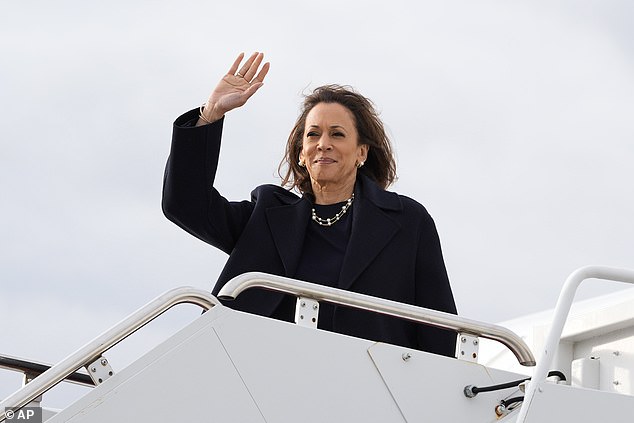
Democratic presidential candidate Vice President Kamala Harris waves as she boards Air Force Two at Oakland County International Airport in Waterford Township, Michigan, Sunday, November 3, 2024, en route to Lansing, Michigan
A Des Moines Register poll released this weekend showed him trailing Kamala Harris by three points in the traditionally conservative state.
That led to Trump’s odds on the betting and prediction markets plummeting.
His lead over Harris on betting site Polymarket fell to seven points over the weekend, but rose again to as much as 18 points on Monday.
Polymarket has placed more than $3 billion in bets on who will win the election.
On the Kalshi betting market, where Harris briefly overtook Trump this weekend, Trump rose to a 10-point lead on Monday.
At the Predictit site, Harris saw a two-point lead on Monday afternoon, having risen as much as eight points over the weekend.
Data from BetVictor showed a flood of bets on Harris over the weekend, with 80 percent of all bets after the Iowa poll going on the Democrat.
Spokesman Sam Boswell said: “A rollercoaster race to the White House took another major turn this weekend, with Kamala Harris seeing her chances diminished.”
But he said it was “the closest election race we’ve seen in a while” and that “the market has rebalanced itself.”
The former president had been rising on a number of gambling platforms for a while, but earlier this week the money started moving to Harris.
Then on Saturday, the Des Monies Register poll showed Harris leading Trump by 47 to 44 percent among likely voters.
Ann Selzer, who conducted the survey, has built a reputation over decades of conducting Des Moines Register polls as “Iowa’s Polling Queen” and the “best pollster in politics.”
Iowa has not voted for a Democrat in the presidential election since Barack Obama in 2012 and was written off this time by the Harris campaign as an easy victory for the Republican Party.
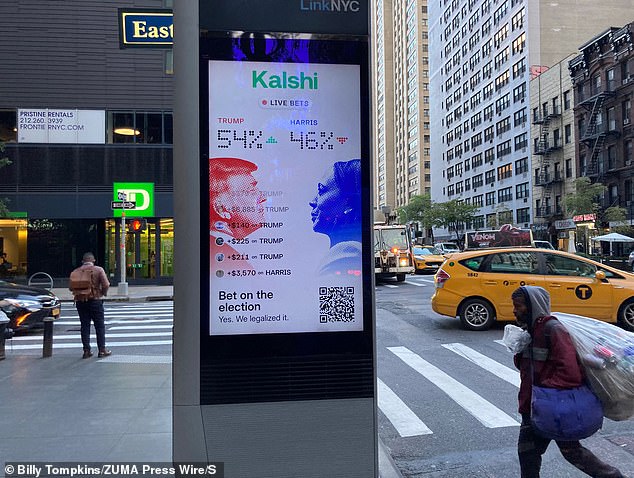
Live election betting on a digital kiosk on a New York City street
Before the Iowa poll came out, Trump was already falling in the betting markets.
Between October 29 and November 1, his odds on both bookmakers Bet365 and Paddy Power fell from 66.7 percent to 63.6 percent.
On the Real Clear Politics average of the betting markets earlier this week, Trump had led Harris by as much as 60.6 percent to 38.1 percent.
The polls have the election close to a close and essentially tied, but the betting markets have consistently given Trump a clear advantage for weeks.
They first started falling on October 27, after a comedian made a disparaging joke about Puerto Rico at the Trump rally at New York’s Madison Square Garden, sparking a widespread backlash.
Kalshi, America’s first legal online betting platform for election predictions, has already placed more than $200 million in bets on the 2024 race.
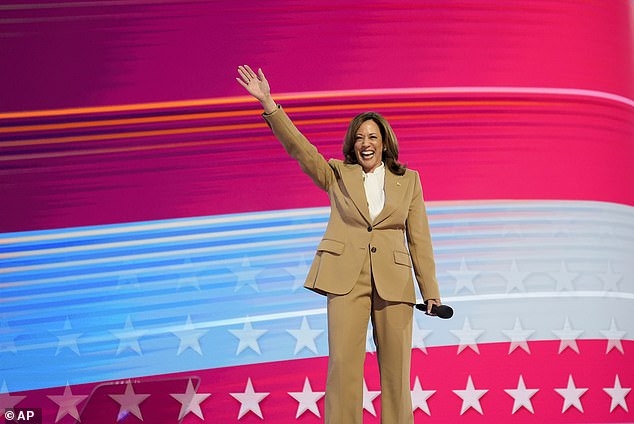
Kamala Harris was far behind in the betting markets
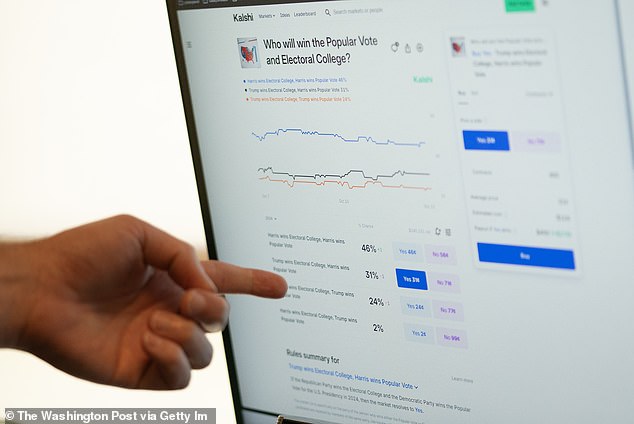
A gambler makes a decision about the election
Last week, Tarek Mansour, the CEO, said that bettors are a more accurate indicator of the outcome than the polls because they have “skin in the game.”
He told DailyMail.com: ‘We certainly have to rely on the [wagering] markets.
“Prediction markets are places where people have money on the line. People don’t lie with their money.’
In 2016, polls indicated that Hillary Clinton would easily beat Trump, but they were wrong.
In the past, betting markets have proven successful in predicting the outcome of elections.
But like the polls, they were not a good indicator in 2016.
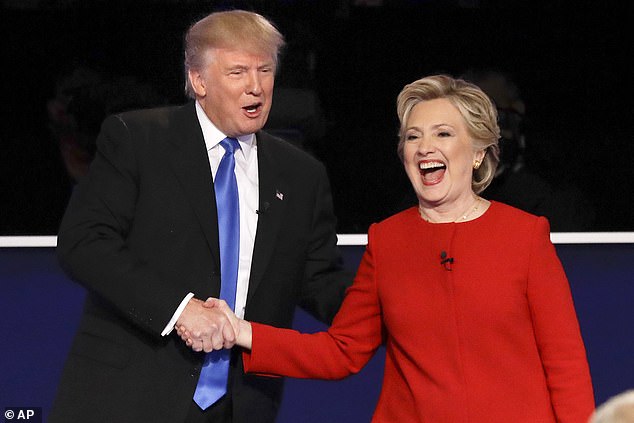
Republican presidential candidate Donald Trump and Democratic presidential candidate Hillary Clinton shake hands after the presidential debate in Hempstead, NY, September 26, 2016
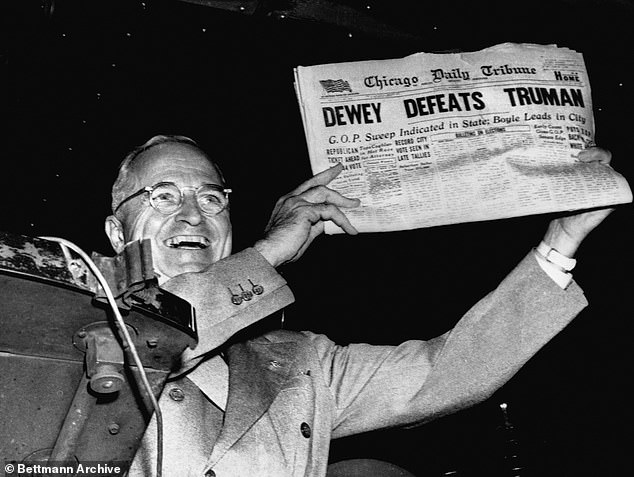
the betting markets were wrong in 1948 when President Harry S. Truman won; Here he cheerfully displays a premature early edition of the Chicago Daily Tribune from his train in St. Louis, Missouri, after his defeat of Thomas E. Dewey
As early as 1924, the Wall Street Journal wrote, “Betting is generally regarded as the best indicator of likely results in presidential campaigns.”
At the time, bookmakers sent people to candidates’ speeches and based the odds on how the public reacted, the newspaper said.
According to a study by economists Paul Rhode and Koleman Strumpf, in the fifteen presidential elections from 1884 to 1940, there was only one upset when the bookmakers were wrong.
In 1948, however, the betting markets, like the polls, were spectacularly wrong when they gave President Harry Truman only about a one-in-ten chance of winning.
